- Revenue Cycle Management
- COVID-19
- Reimbursement
- Diabetes Awareness Month
- Risk Management
- Patient Retention
- Staffing
- Medical Economics® 100th Anniversary
- Coding and documentation
- Business of Endocrinology
- Telehealth
- Physicians Financial News
- Cybersecurity
- Cardiovascular Clinical Consult
- Locum Tenens, brought to you by LocumLife®
- Weight Management
- Business of Women's Health
- Practice Efficiency
- Finance and Wealth
- EHRs
- Remote Patient Monitoring
- Sponsored Webinars
- Medical Technology
- Billing and collections
- Acute Pain Management
- Exclusive Content
- Value-based Care
- Business of Pediatrics
- Concierge Medicine 2.0 by Castle Connolly Private Health Partners
- Practice Growth
- Concierge Medicine
- Business of Cardiology
- Implementing the Topcon Ocular Telehealth Platform
- Malpractice
- Influenza
- Sexual Health
- Chronic Conditions
- Technology
- Legal and Policy
- Money
- Opinion
- Vaccines
- Practice Management
- Patient Relations
- Careers
America's Great National Healthcare Debate and the Legacy of Harry S. Truman
A recent symposium at the Truman Little White House in Key West, FL, looked at efforts to reform America's healthcare system in the decades since President Harry S. Truman's administration.
Since 2003, the Truman Little White House in Key West, FL has hosted annual Truman Legacy Symposium Conferences ranging from, in 2003, Truman’s Legacy on National Security to, in 2014, his Nuclear Legacy with his decision to use The Bomb. Other subjects showing Truman’s legacies have included civil rights, the middle east, the environment, immigration, civil liberties, and, in 2012, foreign aid.
This year on May 15-16, the 11th Annual Symposium subject was "America’s Great National Health Care Debate and the Legacy of Harry S. Truman." Physician’s Money Digest was invited to attend.
Roosevelt was the first to look at questions on America’s healthcare and all 7 recent presidents have tried to address the issues. Archivists found in Harry Truman's memoirs "the greatest disappointment in his presidency was his failure to pass comprehensive health reform.” It surprised them that so successful a presidency could not rise above how Truman saw its possible failures.
The symposium began the Friday evening at the Truman Little White House, where Clifton Truman Daniel, President Truman’s eldest grandson introduced the Keynote Speaker, Robert M. Wah, MD, the president of the American Medical Association. Clifton Truman Daniel has written 2 books about his grandparents. He didn’t know the significance of his family until he’d reached the age of 6. Wah was the same age of 6 when he came to the United States. It was a bit confusing for the child until his father explained, “We are heading for Alcatraz Prison then taking a left; that’s where Asian immigrants are received.”
And now he is the first Chinese-American president of the AMA, one whose grandfather was a Chinese herbal doctor with 5,000 years of Chinese heritage.
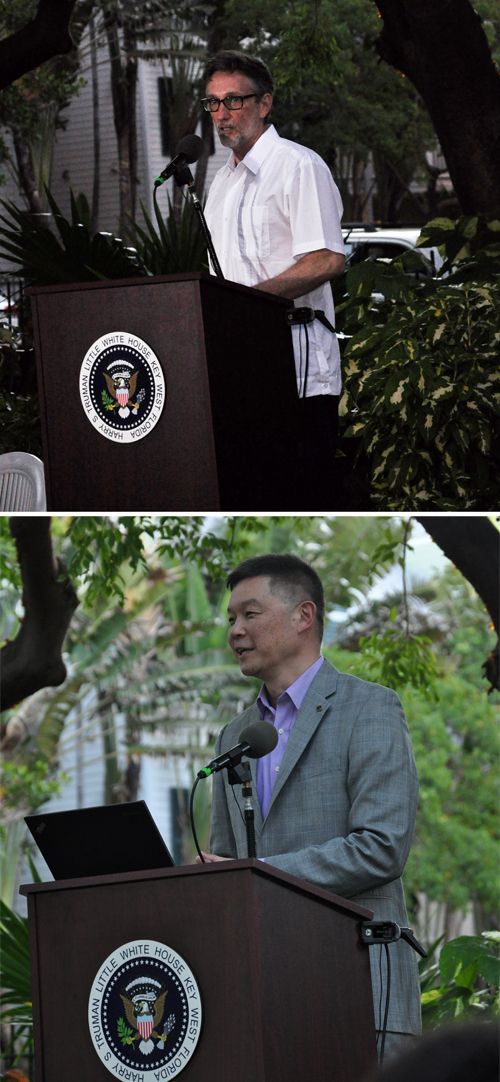
Top image, Clifton Truman Daniel
Bottom image, Robert M. Wah, MD
Wah explained the structure of the AMA to the lay members of the Truman Foundation who had gathered on the north lawn to hear him. He was proud that its membership, now 230,000, has increased in number for the last 4 years. He talked about the AMA's push to improve medical education way back in 1847, how it had raised the bar more than other professions. He also discussed how the quality of medical education was now established, how the AMA offers tools for practicing doctors, and how, especially, the AMA advocates for both patients and physicians.
Asked about healthcare reform, he responded that, as a physician, he understood that evolving societies become protective of each other to overcome challenges. We, doctors, fight that battle every day, and if we ask, “How can a society protect itself against its vulnerability?” Well, one way is by insurance.
Some people see government-assisted insurance as a flawed concept but, says Wah, did you notice the tribute Britain gave to its National Health Service at the recent welcome to the London Summer Olympic Games. That shows how proud the British are of their health service. But health delivery has really changed over the last 100 years: At the end of World War II healthcare was #7 on an American's budget long after food and clothing. Now costs have more than doubled.
He was asked his thoughts on prescription drug abuse and countered the AMA policy was the appropriate use of all doctors’ tools. He was asked to comment on the MedMal crisis and replied vehemently. “That term should be eliminated; what we have in America is a professional liability crisis. Ninety percent of all doctors have been sued before they reach the age of 55. We feel questions about the quality of the delivery of medical care should be left to those delivering medical care.”
Comment: I feel Wah will be good for what has long been a stuffy old-boy organization. For his inauguration as president in 2014, where the copperplate invitations listed the dress code as the usual “Black Tie Option,” he added “Beach Wear Welcome”—and he himself came dressed in a combination.
The next day at the Key West Marriott Beachside Hotel, we heard from academics who had worked with Harry Truman.
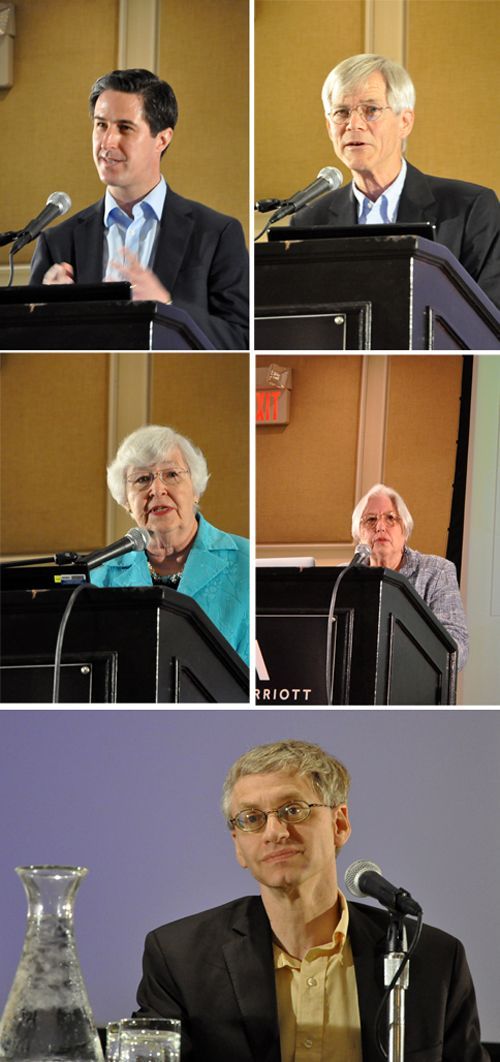
Top left clockwise:
Moderator, Steven Edwards, Executive Director, Institute of Politics, University of Chicago
Dr. Raymond Geselbracht, Former Assistant to the Director of the Truman Library
Claudia Anderson, Supervisory Archivist, Lyndon B. Johnson Presidential Library
Dr. Victoria Harden, Former Director of the NIH History
Dr. Harold Pollack, Helen Ross Professor of Social Service, Administration and Public Health Sciences, University of Chicago
The nonpartisan Institute of Politics, University of Chicago, (based on a somewhat similar institute at Harvard University) “is an extracurricular program designed to ignite in young people a passion for politics and public service.” The moderator of this Historical Perspective on United States Healthcare, Steven Edwards, tells the audience how presidents had tried and failed to create comprehensive health reform before Obama, and how a staffer whose child suffered seizure disorders openly wept when Obama’s ACA passed.
Edwards introduced Dr. Raymond Geselbracht, former Assistant to the Director of the Truman Library who reminded us that Harry Truman had been a farmer who had no ideological fears and who probably was not influenced by “progressives.” Truman felt the Presidency was a tool to solve problems and felt the government had a role to create solutions. Truman never felt government help corrupted Americans. “He had no anti-government rhetoric!”
Truman, who had served as a captain in the artillery in World War I was particularly appalled to find the health of American males was so poor—35.5% failed their induction physicals for military service in World War II.
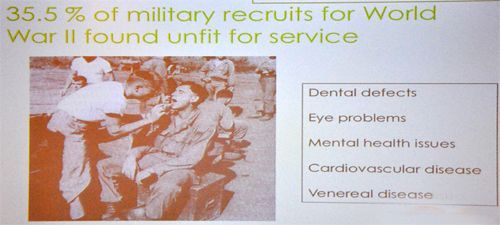
Says Geselbracht. “President Truman felt the indigent and rich were well-treated” with health issues but not those in between. Truman had an orderly mind and wanted to see the financial repercussions from any health bills passed. But he had difficulties with Congress; because FDR had pushed too hard in 1938 with his New Deal. The public believed too much help was going to the cities and thought the policies were too liberal. Truman insisted his program was not socialized medicine but the AMA claimed the opposite.
Yet when LBJ finally was able to sign the Medicare Bill, he chose the Truman Presidential Library in Independence, MO, for the ceremony and gave the first pen he used to Bess Truman and the second to Harry, saying, “The people of the United States love and voted for Harry Truman, not because he gave them hell—but because he gave them hope.”
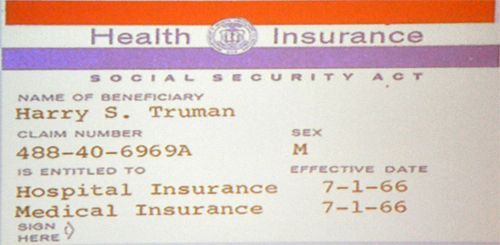
Claudia Anderson, the supervisory archivist at the Lyndon B. Johnson Presidential Library had some fascinating long-forgotten information about LBJ. In front of the current president of the AMA she reminisced how her president essentially outfoxed the AMA’s threat of a national boycott of Medicare, holding out the possibility that as many as 95% of American doctors would follow suit. Johnson met at his Ranch with 11 AMA officers ostensibly to ask AMA support for a program rotating doctors into Vietnam to serve the civilian population. “When they agreed to the latter, Johnson ordered an impromptu press conference, where he praised the AMA for its commitment to the Vietnamese. When a reporter asked whether the AMA would support Medicare, Johnson declared, ‘These men are going to send doctors to Vietnam where they may be killed. Medicare is the law of the land. Of course, they’ll support the law of the land.’
“He then turned to the AMA group, ‘You tell him.’ Put on the spot, the AMA president replied, ‘Of course, we will. We are law-abiding citizens, and we have every intention of obeying the law.’ Within a matter of weeks, the AMA formally endorsed Medicare, with 95% of doctors following suit.”
Dr Wah has to be respected. While the AMA was mentioned by some of the academic speakers as the adversary of government medicine he maintained an inscrutable face while waiting his turn to sum up the proceedings.
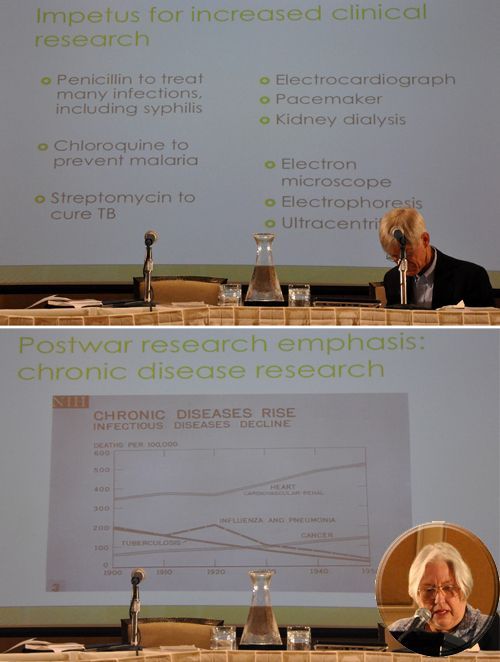
The next speaker, Dr. Victoria Harden, Former Director of the NIH History, talked about the creation and success of the NIH dealing with mental and dental health, neurological and cardiovascular disease, and allergic, arthritic and infectious disease, although as infectious disease was tackled, so chronic disease became more an issue.
New NIH targets? DNA and genetic codes, home pregnancy tests, expanding rural health care—and a path to precision medicine.
Dr Harold Pollack, Helen Ross Professor of Social Service, Administration and Public Health Sciences, University of Chicago then discussed the Affordable Care Act—and the current state of healthcare in our country. “It has been a wild ride” [to bring health care where it now is], he says. “We thought it would be like this… (showing a slide of Margaret Thatcher and the Falklands War), but it was more like World War I—but lasting longer.” (He then put up a slide to show trench warfare in WWI. The slides are dark and may not be easily visualized online.)
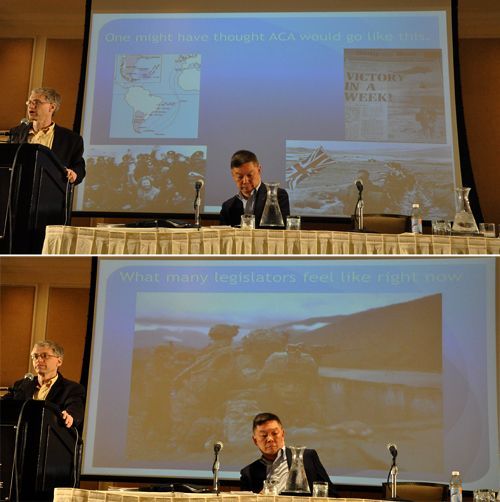
Pollack must be a popular lecturer at the university; he has an easy manner and shows a slide of how when talking about Obamacare, he chose to wear a police bulletproof vest. Now ACA has some years behind it, Obama might well be acknowledged on the ceiling of the Sistine Chapel.
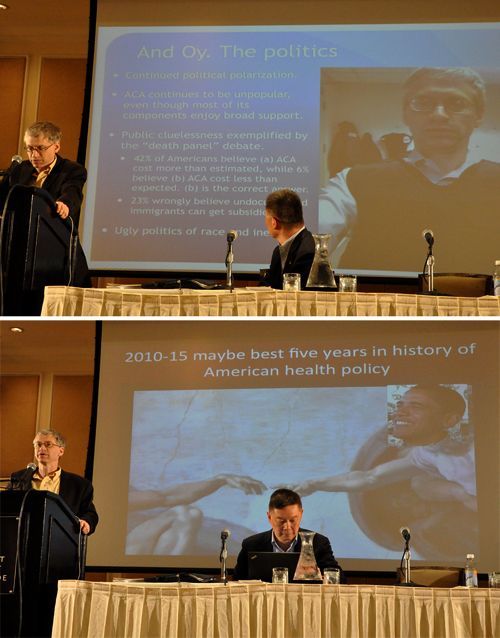
Why is healthcare reform important? Pollack asks and answers his own question. Because 16% of the GDP is not sustainable, although young people pay more for their cell phone bill than for healthcare.
Why don’t we simplify healthcare and get rid of complications? He answers with: It’s never going to happen. It would disrupt the lives of too many people. And who says we have the best medical service in the world? Answer: Some of the proponents of medical marijuana!
Yet, says our final speaker, AMA President Wah, the problem with health insurance is that the industry regards any payout for service as a “loss.” If a company takes $1 in premiums and pays out 98 cents for treatments, the 98 cents is seen as loss.
He talks, too, about “what happens when you stand on a spider; it goes ‘Splat’ all over.” To illustrate, Wah shows a slide of Hillary Clinton’s secret attempt to reconfigure healthcare in 1994—the plan that excluded physicians from discussions. He feels physicians should know that when it comes to Affordable Care Organization (ACO) discussions, “If you are not at the table, you are on the table!” (as an entrée).
Asked about medical malpractice reform he feels there is some progress at state level but does not see it happening in federal law because in the USA we foster an environment that allows persons to speak their minds and are now so involved in disagreement we forget the subject of the original disagreement. I would have liked to have heard something about the AMA’s concerns about the Independent Payment Advisory Board and would welcome some insider information about the mysterious committee that decides on the relative value of medical procedures.
He ends the symposium by saying, “I believe a lot of Democrats now regret they didn’t cooperate better with President Nixon in his health initiatives.”
All Photographs by Author
The Andersons, who live in San Diego, are columnists for Physician's Money Digest. Nancy is a former nursing educator, Eric a retired MD. The one-time president of the New Hampshire Academy of Family Physicians. Eric is the only physician in the Society of American Travel Writers. He has also written 5 books, the last called The Man Who Cried Orange: Stories from a Doctor's Life.
